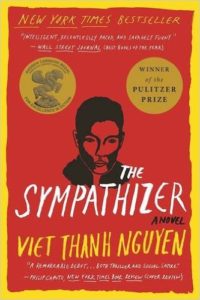 The Sympathizer by Viet Thanh Nguyen
The Sympathizer by Viet Thanh Nguyen Published by Grove Press on April 12th 2016
Genres: Historical Fiction
Pages: 384
Format: Paperback
Buy on Amazon
Goodreads

Winner of the 2016 Pulitzer Prize for Fiction, The Sympathizer is a Vietnam War novel unlike any other. The narrator, one of the most arresting of recent fiction, is a man of two minds and divided loyalties, a half-French half-Vietnamese communist sleeper agent living in America after the end of the war.
It is April 1975, and Saigon is in chaos. At his villa, a general of the South Vietnamese army is drinking whiskey and, with the help of his trusted captain, drawing up a list of those who will be given passage aboard the last flights out of the country. But, unbeknownst to the general, this captain is an undercover operative for the communists, who instruct him to add his own name to the list and accompany the general to America. As the general and his compatriots start a new life in Los Angeles, the captain continues to observe the group, sending coded letters to an old friend who is now a higher-up within the communist administration. Under suspicion, the captain is forced to contemplate terrible acts in order to remain undetected. And when he falls in love, he finds that his lofty ideals clash violently with his loyalties to the people close to him, a contradiction that may prove unresolvable.
A gripping spy novel, a moving story of love and friendship, and a layered portrayal of a young man drawn into extreme politics, The Sympathizer examines the legacy of the Vietnam War in literature, film, and the wars we fight today.
I’ve been working on finishing this book for a long time, and I am trying to figure out why it was so hard to pick back up again on the occasions when I put it aside because I did like the book. I don’t have to sympathize with the main character in order to like a book (I love Wuthering Heights and find all the characters difficult to sympathize with). So, even though the narrator can be difficult to “like,” I don’t think that is the problem. I can appreciate a finely tuned sentence. I think ultimately, however, the plot really needs to move along, and in some places, the plot of The Sympathizer plods. Two notable exceptions are a chunk of the middle of the book when the unnamed protagonist is consulting on a Vietnam War movie, The Hamlet, that is clearly modeled after Apocalypse Now and Platoon and again towards the end after the protagonist is captured upon returning to Vietnam. I recognize Nguyen’s argument that the Vietnam War is exceptional in that the war’s defeated have controlled the narrative about that war, starting with movies like Apocalypse Now and Platoon and continuing with novels like Tim O’Brien’s The Things They Carried. I love that novel, but it erases the Vietnamese people entirely from its narrative. In my favorite passage in the book, the protagonist reflects on his failure to reclaim the narrative through working with the director of The Hamlet:
I had failed and the Auteur would make The Hamlet as he intended, with my countrymen serving merely as raw material for an epic about white men saving good yellow people from bad yellow people. I pitied the French for their naïveté in believing they had to visit a country in order to exploit it. Hollywood was much more efficient, imagining the countries it wanted to exploit I was maddened by my helplessness before the Auteur’s imagination and machinations. His arrogance marked something new in the world, for this was the first war where the losers would write history instead of the victors, courtesy of the most efficient propaganda machine ever created (with all due respect to Joseph Goebbels and the Nazis, who never achieved global domination). Hollywood’s high priests understood innately the observation of Milton’s Satan, that it was better to rule in Hell than serve in Heaven, better to be a villain, loser, or antihero than virtuous extra, so long as one commanded the bright lights of center stage. In this forthcoming Hollywood trompe l’oeil, all the Vietnamese of any side would come out poorly, herded into the roles of the poor, the innocent, the evil, or the corrupt. Our fate was not to be merely mute; we were to be struck dumb.
The Sympathizer is brilliant. I think it suffers a bit from some of its own good press. For example, Ron Charles (who writes brilliant reviews for The Washington Post), described this book as “a cerebral thriller around a desperate expat story that confronts the existential dilemmas of our age.” So, I was expecting a thriller. It’s not, really. As to the rest of Charles’s description, it’s accurate, and his review will give you an excellent idea about what makes the book great. Ultimately, it dragged in some places for me, but I can appreciate what Nguyen has done with this novel.

